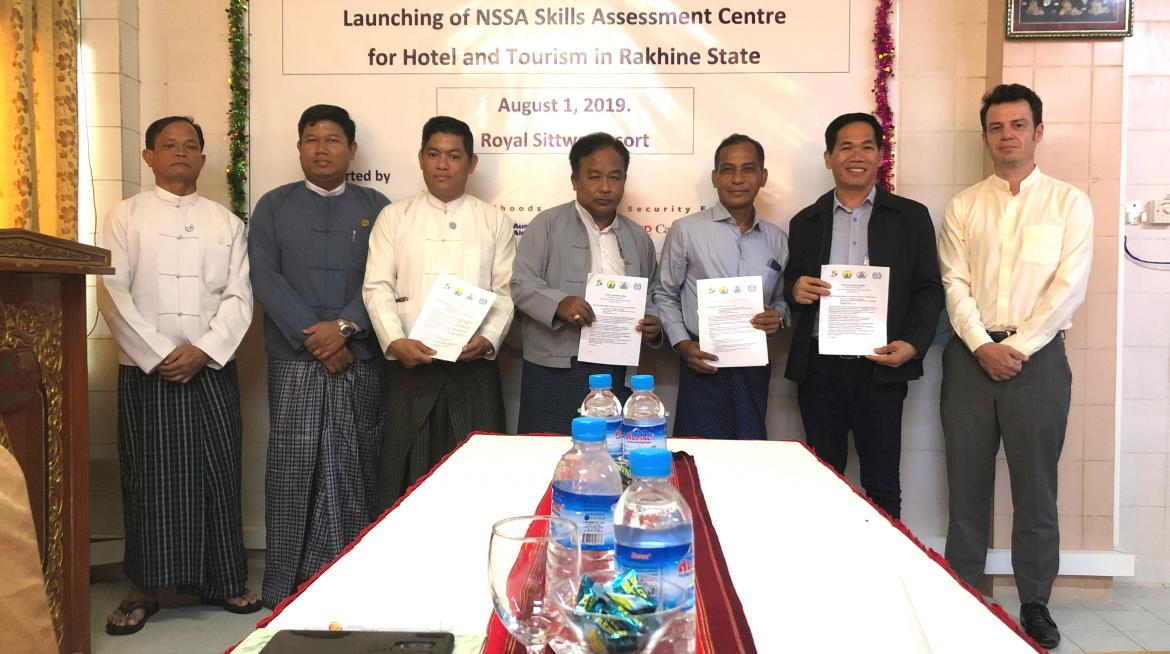
LIFT partner the International Labour Organization (ILO) has launched a skills assessment centre in Sittwe as part of the Skills Development Project - Rakhine State (SDPRS), to provide Government-recognised skills certificates to workers in Rakhine. The launch of the centre, first of its kind in Rakhine, took place on 1 August. The centre will promote productive employment and poverty reduction in Rakhine while bringing together the three constituents of ILO’s core mandate – workers, employers and the Government.
The centre is supported by ILO under the Skills Development Project funded by LIFT. Accredited by the National Skill Standards Authority (NSSA), it is a public-private partnership involving the Royal Sittwe Hotel, the Department of Labour, the Ministry of Hotel and Tourism and the Association of Sittwe Hotel Managers.
Nicolas Guillaud, LIFT’s Livelihoods and Food Security Specialist for Rakhine, said at the launch: “LIFT aims to help people in Rakhine State, poor and vulnerable women, men, girls and boys, people affected by conflict, to develop their skills and find decent work opportunities. One way of doing this is through the Skills Development Project implemented by ILO, which supports and reinforces the technical and vocational education training system and structures in Rakhine State.
“This skills assessment centre will help TVET participants, or individuals who are already employed, to upgrade their skills to match the requirements of the employers and of the labour market. LIFT also hopes that the centre can help job seekers find decent work so that they can also fully contribute to the expansion and sustainability of important businesses in Rakhine State.”
The launch hosted 20 key Myanmar stakeholders, Government officials and private sector representatives. Peter Bellen, Chief Technical Adviser of the ILO Skills Development Project in Rakhine State, delivered an opening speech providing insight into the programme: “When I met with the Rakhine State Chamber of Congress with many of the employers, their main complaint was that it is difficult to recruit workers in Rakhine State because applicants often do not have the skills required for the jobs in question.”
He explained that employers coming to Rakhine therefore tend to hire people outside the region, from Yangon and other states, because they have skill certificates and are as such seen as better qualified. Ultimately, “the people here can’t find employment”, said Bellen.
The first skills assessment centre will focus on the hotel and tourism industry, offering level-1 waiter and room attendant certifications. The aim is to create more opportunities and make community life more accessible to women.
“The hotel and tourism industry is a vital economic sector in Rakhine State”, added Nicolas Guillaud. “It is also a sector that offers great potential for women’s empowerment, and greater gender equality, unlike many other sectors”.
“Current developments are evidence that we can make things happen if we believe in cooperation rather than competition”, said Bellen, adding that employers will have more sustainable businesses if they commit to decent work. “Workers supported by international non-governmental organisations and other agencies will have greater employability and a Government working to establish an enabling environment will see more prosperous and cohesive communities.”
The launch featured supporting messages and speakers also from the Department of Labour and the Royal Sittwe Hotel, with closing messages from the Ministry of Hotel and Tourism.
With support from LIFT, a second skills assessment centre in Sittwe focusing on the construction industry is set to be launched by ILO by the end of 2019.
WRITER: Joo Hwan Lee


